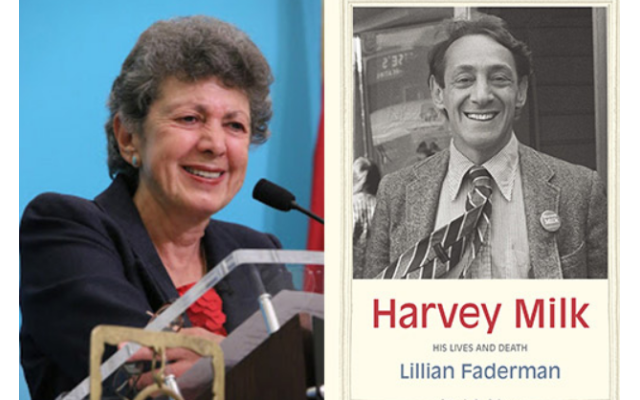Rothschild Lecture Features The ‘Lives’ of Harvey Milk
Harvey Milk, the 1970s gay political pioneer and activist, will be the subject of the 11th annual Rothschild Lecture.
Harvey Milk, the 1970s gay political pioneer and activist, will be the subject of the 11th annual Rothschild Lecture. It will be presented by The Tam Institute for Jewish Studies Nov. 18 at Emory University.
The lecture, “Harvey Milk Through a Jewish Lens,” will be delivered by Lillian Faderman, a prominent scholar of lesbian and LGBT history. She is the author of the Harvey Milk biography in the Yale University Press series of Jewish lives.
AJT: How would you describe Harvey Milk’s life?
Faderman: He was very complex. I subtitled the Yale Press book, “His Lives and Death.” And what I mean by lives is he just he kept changing who he was. … He was a jock in high school and in college, and he was a hippie for a long time on and off Broadway. And he was an associate of the guy who produced “Hair” and “Jesus Christ Superstar.” He was on Wall Street. He was a teacher and he was a shop owner. And finally, of course, he became a politician in San Francisco. But that was just in the last five years of his life. What I tried to show is how each of those personas finally led up to who he became as a politician.
AJT: What were the qualities in his life that allowed him to have so many identities?
Faderman: I think he loved the limelight. And that was certainly one aspect of him. But I think he also had a genuine social conscience. And that goes back to his being Jewish in the times in which he was brought up. His bar mitzvah was just about the time of the destruction of the Warsaw Ghetto. And I think that his social conscience really formed him in important ways. And I think that he learned to become a charismatic leader.
AJT: And, of course, one of his most important roles was as a gay man and a gay activist.
Faderman: He thought it was very important that we all come out now. He did not come out to his parents. His mother died in the early 1960s. He never came out to his father. But it was after his father’s death that I think he examined his own feelings and he realized that it was a mistake not to come out and it’s a mistake politically. And so he urged gay people to come out of the closet.
And he said in several of his speeches and in his writings, you have to come out; come out to your parents, come out to your neighbors, come out to your friends. If they’re really your friends, they’ll love you for who you are. … And he was absolutely right about that, because more of us have come out in recent years and we see the difference it’s made.
Harvey said it’s the responsibility of adult gay people to pave the way for young gay people. Not to make them gay, quote, unquote. That doesn’t happen. But to show that you can survive, to show that you can lead a productive life as a gay person.
AJT: How would you say his Judaism informed his political life?
Faderman: He was a very Jewish without being religious. Now, his grandfather actually co-founded in the 1920s the first synagogue in Woodmere, Long Island, where Harvey was born.
So Harvey had his bar mitzvah. But after that, he stopped being religious. And he said at one point there was just so much hypocrisy in the religion. And then finally, and I myself am not sure exactly what it means, but I interviewed the rabbi at San Francisco’s gay synagogue, and I interviewed several of the congregants. And they all told me that for his last high holidays, Harvey went to the gay synagogue. And I’m not sure if it meant that he was actually thinking of coming back to the religion before he was murdered in November of 1978.
AJT: And how do you think he’s affected your life?
Faderman: Well, I grew to love him. You know, when I wrote this biography, I just kept running across all his warts, and I thought, wow, should I really talk about this? And I did because I thought he was such a complex person. And I think I can honestly say I grew to love him warts and all.




comments